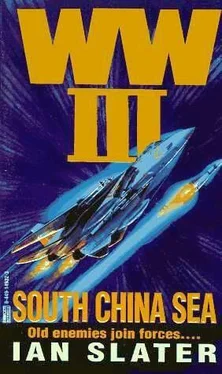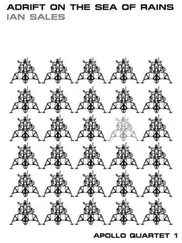* * *
That possibility was to become a certainty on Chical 7, another joint Chinese-U.S. venture platform already in production in the Paracel Islands, five hundred miles southeast of China’s big island of Hainan. The Paracels, lying east of the Gulf of Tonkin, were claimed by both China and Vietnam. The rig was afire and deserted except for the dead bodies picked out by a carrier plane’s reconnaissance infrared-sensitive cameras. Again the message originated from the Seventh Fleet — the overflight made by F-18s aboard the U.S. carrier Enterprise — and was relayed through Blue Ridge up the chain of command to the White House.
“Jesus Christ!” the President blurted. “Would someone tell me what in hell is going on?” His angry surprise became outright alarm when he was told that while Chical 7 was southeast of Hainan, it was also effectively in the Gulf of Tonkin, two hundred miles off Vietnam.
“Vietnam” and “Tonkin Gulf were the two places in the world that no U.S. President wanted to hear about ever again, but by now over sixty-five Americans working in the Paracels and Spratlys had been murdered. And CNN — nobody knew how they’d found out so quickly — wanted to know why, and what the President was going to do about it. Already the White House phones were jammed with calls.
“This was a leak!” the President thundered, his clenched fist banging the desk. “A goddamned leak somewhere along the chain of command. And I want to know who—”
He was interrupted by Ellman, who seemed in shock. “Mr. President.”
“Yes?”
“Sir, we’ve just heard via CIA’s Hong Kong station that China’s moving an additional three PLA divisions — over forty thousand men — to the China-Vietnam border.”
“Where on the border?”
“Ah—” Ellman looked quickly at his notes. “—within striking distance of a Vietnamese place called Lang Son.”
“Has Beijing made any statement?”
“Yes, sir. Apparently the move is to signal Beijing’s displeasure toward, and I quote, ‘the warmongering Vietnamese imperialists who are blatantly attacking Chinese possessions in the South China Sea.’ “
“Call the Joint Chiefs and whoever has the China desk at State.”
“Yes, sir.”
Ellman gave the task to his junior while he himself called the Secretary of the Navy. “Mr. Secretary? Bruce Ellman, White House. Sir, we’re in damage-control mode re this business in the Spratlys and Paracels, and the media are clamoring. Are you up for the ‘Larry King Show’?”
“No.”
“It has to be this week, sir. Otherwise it’ll look like we don’t know what’s going on.”
“Do we?”
“No, but we’re trying to—”
“No.”
Ellman knew he was on his own.
In Ho Chi Minh city — once called Saigon — the night was filled with the sounds and smells of scooters and vendor stalls, for even with galloping inflation, enough of the 4.5 million Vietnamese in the city had been able to buy the three-thousand-dollar, two-stroke-powered motorbikes, no doubt sacrificing much along the way. To own a scooter in Vietnam was like owning a car anywhere else.
Despite familiar odors of gasoline fumes mixed in with the pungent smell of cooking and spices, it was still nothing like Saigon used to be. It lacked the excitement and zest of the old Asian “Paris” nightlife. Still, even though it was more than twenty years since Vietnam’s defeat of the Americans in ‘75, the Socialist Republic of Vietnam had failed to kill the entrepreneurial wiles of beggars and ladies of the night. It was simply more organized. Many of the beggars in good health had been sent to reconstructive labor battalions, a move that U.S. Army captain Ray Baker, assigned to the U.S. legation office, endorsed as he walked through the dimly lit city with a mixture of nostalgia and anger.
It had been difficult enough to accept the defeat. Every American alive at the time — and not only those who had fought in ‘Nam — had that picture frozen in their memory: the sight of a lone chopper poised atop the American embassy, a string of frantic people falling from it, trying to board, those already aboard shoving them off — everyone for himself. Americans and South Vietnamese in panic. And then there was the sight of Huey choppers heading out from the delta over the South China Sea like so many angry gnats dotting the sky, fleeing, again in panic, landing atop a Seventh Fleet carrier, and once the human cargo had been disgorged, not going back again but being pushed overboard — three million dollars a pop. And when the carriers couldn’t provide any more deck space, the helo pilots cut off the engines, coming down in a semi-controlled crash, pancaking on the sea with about thirty seconds to escape before the doomed chopper began its slow then sudden dive to the bottom, bodies floating up and swimming soundlessly beneath the noise from the six-thousand-man carrier, as many on deck as possible — against orders — just standing there, witnessing the historic humiliation and debacle of me awesome American defeat.
This evening Ray Baker wanted to evict that image from memory, but the more he tried, the more persistent and nagging it became, and for a moment he was glad it was nighttime, as if the darkness could somehow hide his private sense of humiliation. But on second thought, what the hell did he have to be ashamed of anyway? He’d done his bit, hadn’t he? Or was he unconsciously harboring the secret torment that if he’d done that little bit extra during the war — if enough of them had done more, gone that extra mile — it might have been enough to turn the tide? For some vets who had fought in the Iraqi War, a full measure of self-respect had been reclaimed, but Baker had not been with Schwarzkopf’s winning team. While many of his buddies had been racing over the desert destroying Saddam Insane’s armor and closing on the Republican Guard — when the most terrifying phrase for the Iraqi combat pilots was “Permission to take off!”—Ray Baker was sweating in the shirt-clinging tropical climate of the Mekong Delta, still trying to find out after twenty years what had happened to all those unaccounted-for MIAs and POWs who some believed were still held prisoner deep in the jungles of the north.
Tonight he was going out to meet yet another “lead,” the follow-up to yet another informant’s phone call about yet another POW-MIA tip — another 100,000 new dong, ten U.S. dollars — just for the meet. Another ten for whatever his informant told him, even if it was bullshit — otherwise the informant might not come back if he did find something more concrete at a later date.
At the U.S. legation office they told Baker he was wasting his time, and he knew they were probably right, but if after all these years he could bring even one American out, bring one American home, it would be worth something. For himself, yes — for the man’s family it would be everything. It was worth doing.
He lit another cigarette and made his way toward the heart of Cholon, the big market district largely populated by Chinese, once a thriving capitalist community but now much less so, after the anti-Chinese purges of the late 1970s. Now and then amid the gasoline fumes of the scooters, Baker could smell the freshly made French bread, croissants, and coffee from the sidewalk kiosks. There were dozens of them, the people of old Saigon refusing to give up the habits and civilities that had once made this vital part of the old city one of the busiest capitalist enclaves in all Asia. The Communists had realized their mistake in ostracizing so many Chinese, and were now letting many of them back to revitalize the ancient city of French Indochina, but many had already escaped through Hong Kong or been killed by pirates who boarded the boat people’s sailboats to steal, rape, and murder.
Читать дальше












